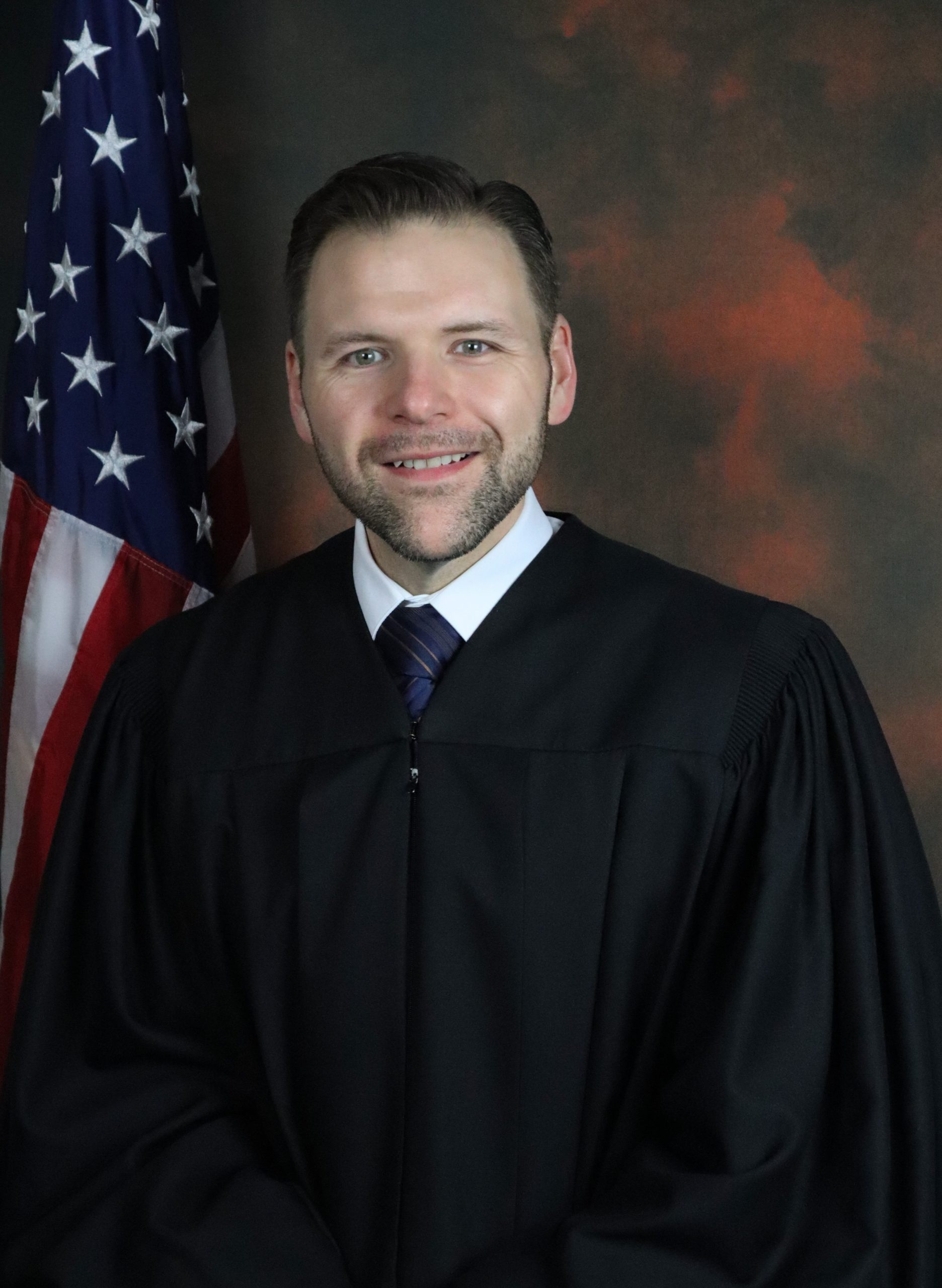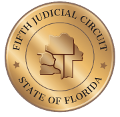
Jason J. Nimeth
Circuit Judge
Judicial Assistant: Audrey Hatcher
Email: ahatcher@circuit5.org
Office: (352) 742-4390
Fax: (352) 742-4227
Scheduling a Hearing
Parties requesting a hearing shall send an e-mail request to Audrey Hatcher as hearings are not scheduled by telephone. The e-mail should be copied to all other parties in the action and include the case number, county where the case is pending, the name of the motion to be heard, and the total length of time requested. You will then receive a list of available dates and times for the hearing. Only upon each party’s agreement to a specific date and time should you send an e-mail to Ms. Hatcher confirming the selection of a date and time. Hearing times are set on a first come, first served basis. The coordinating party must provide the Court with a courtesy copy of the Notice of Hearing to finalize the hearing selection.
In cases where the parties are unable to obtain agreement as to when a motion should be heard, the moving party shall file a motion, copied to opposing counsel, memorializing the interactions of the parties and the previously relayed dates and times proposed. The Court will then select a date and time that allows for reasonable preparation while avoiding unnecessary delay for the parties or the case. See Florida Rule of General Practice and Procedure 2.545.
Each party is responsible for guaranteeing that enough time has been requested to allow all parties to reasonably present their case.
Virtual Hearings
All virtual hearings are held through Zoom utilizing Meeting ID 620 228 8448. The Court will not send out individual meeting invites. All participants to a virtual hearing must join with a functional camera, speaker, and microphone. The camera must remain active for the entire hearing. If a participant is unable to have an active camera, the hearing should be held in-person or telephonically to avoid concerns about unobservable communication or behavior amongst other participants. Virtual hearings are only recorded when required by Florida law, and no party shall record the proceedings except the Court.
Attorneys appearing on behalf of a client at a virtual hearing are expected to dress and conduct themselves in the same manner as if in a traditional courtroom. The environment from which a participant joins must be free from noises, distractions, or environmental interference. Participants shall identify any other individuals present with them to the Court and opposing counsel. The parties must comply with Fifth Judicial Circuit Administrative Order A-2021-58(IX). Where not inconsistent, the parties should also follow The Florida Bar Recommended Best Practice for Remote Court Proceedings. Failure to comply with these provisions may result in the Court’s rescheduling of the hearing to be held in-person.
Evidence for virtual hearings must be physically delivered to the Court as the Court will not print evidence for the parties. Delivery should be coordinated with Audrey Hatcher due to the Court’s assignment to multiple counties.
Cancellation of Hearings, Motions to Continue, and Notice of Conflict
When a movant no longer desires to proceed with a scheduled hearing, the movant must file a Notice of Cancellation with a courtesy copy to the Court. However, if the hearing is one set by the Court, it will only be cancelled through a voluntary dismissal, entry of a stipulation and order dismissing the cause of action, or an order from the Court.
Motions to continue must set forth specific grounds for the request as general statements will be insufficient. Motions to continue shall also include the position of opposing counsel as to the motion. The moving party shall send a courtesy copy to the Court with a proposed order. Each motion to continue will be reviewed on a case-by-case basis to determine whether the Court is able to rule on the face of the pleadings or whether a hearing is required. The stipulation of opposing counsel does not guarantee the granting of a continuance.
A party having a conflict with a hearing shall comply with Florida Rule of General Practice and Judicial Administration 2.550(c). The Notice of Conflict shall contain at least the following information: the case number creating the conflicts with the county of the case and the name of the judge presiding over the other case. This notice should be filed immediately upon discovery of the conflict with a courtesy copy to the Court.
Cross-Noticing Hearings
Any party desiring to cross-notice a motion with a previously scheduled hearing may do so only with permission of the Court. The requesting party shall request permission by contacting Audrey Hatcher through e-mail with opposing counsel copied. The e-mail shall include the name of the desired motion to be cross-noticed, the currently scheduled date and time of the existing hearing, and opposing counsel’s position on the request. After review of the submitted request, the Court will notify the parties through e-mail as to whether the request to cross-notice is approved or denied.
Notice that Cause is at Issue
A courtesy copy of the notice that the cause is at issue should be sent to Audrey Hatcher through e-mail.
In non-jury cases, the Court will set a pretrial conference where counsel for the parties shall appear to discuss the scheduling of trial; discovery deadlines; a mediation deadline, if it has not already occurred; possible stipulations between the parties; and an exhibit and witness list exchange deadline. The Court will not hold another pretrial or case management conference prior to trial or required by law, unless requested.
In jury cases, the Court shall set a case management conference where counsel for the parties shall be expected to appear to discuss the scheduling of trial; discovery; deadlines, and a mediation deadline, if it has not already occurred; and an exhibit and witness list exchange deadline. A pretrial conference will be scheduled to occur approximately thirty days prior to the beginning of trial.
In actions for relocation pursuant to section 61.13001, Florida Statutes, the ninety-day trial requirement shall be calculated from the Court’s receipt of the notice as the Court does not automatically receive notice of documents filed with the Clerk of Court. Upon receipt of the notice, the Court will automatically schedule a pretrial conference and a trial in accordance with section 61.13001(10). At the pretrial conference, the parties shall be prepared to address any good cause regarding the timing of the trial along with any other issues relating to the trial of the action.
Juvenile Procedures
Order Establishing Procedures for Juvenile Delinquency Casses Assigned to the Undersigned
Proposed Orders
Orders should not be submitted unless ready for immediate entry. The following proposed orders shall be sent to the Court through hand delivery or regular U.S. mail with conforming copies and stamped envelopes: Final Judgments of Foreclosure and Continuing Writs of Garnishment.
All other proposed orders should be submitted through e-mail to Audrey Hatcher in an editable document such Microsoft Word. The drafting party should provide a copy to opposing counsel for review prior to the submission. If there is a disagreement as to the language of the order, the preparing party shall place the Court on notice of the nature of the disagreement. If an order is agreed between the parties, the title of the order should include “Agreed” at the beginning of the title.
A proposed order should automatically be submitted with the following motions: Agreed Motion for Extension of Time; Agreed Motion for Leave to Amend Complaint; Motion to Appoint Process Server; Agreed Motion to Appoint Guardian ad Litem; Motion to Appoint Attorney ad Litem; Motion for Default Final Judgment, if damages are liquidated; Motions to Withdrawal from Representation, if your client is consenting; Motions to Continue; or any other agreed motion between the parties.
All proposed orders shall include a certificate of service in compliance with Florida Rule of General Practice and Procedure 2.516. The certificate of service shall contain language substantially similar language to following:
I HEREBY CERTIFY that a true and correct copy of the foregoing has been provided through electronic service and/or regular U.S. mail to the following parties.
Failure to provide the required certificate of service may result in the Court’s rejection of the proposed order and request for a new order.
In cases involving a self-represented litigant who is not participating in electronic service through the e-filing portal, the proposed order must include language that the prevailing party will serve the order through regular U.S. mail on the self-represented party and certify said service through a filed notice of service within five (5) days of the entry of the order. This provision is an effort to eliminate the costs of providing copies and self-addressed stamped envelopes to the Court with proposed orders. Failure to include this language may result in the Court’s rejection of the proposed order and request for a new order.
Case Law and Memoranda
Any party desiring to submit case law and/or a memorandum of law for an upcoming hearing may submit these materials electronically to Audrey Hatcher. The Court desires that these materials be submitted at least ten days prior to the scheduled hearing.
Parties submitting binders, case law, and/or memoranda physically should make sure that the material sent at least one week in advance of the hearing.
Evidence
Evidence should only be delivered to the Court for virtual hearings.
The Court will not print evidence for virtual hearings. The Court will not review submitted evidence prior to the trial and will not review the evidence unless properly admitted. See Wilson v. Armstrong, 686 So. 2d 647, 648 (Fla. 1st DCA 1996) (“Canon 3 excludes all ex parte communications with all judges in all judicial proceedings, except when expressly authorized by law” (citing Inquiry Concerning Miller, 655 So. 2d 75, 78 (Fla. 1994); Inquiry Concerning Clayton, 504 So. 2d 394, 395 (Fla. 1987))).”
Please click here for incapacity forms.
*NOTICE TO THE PUBLIC:* The Code of Judicial Conduct governing behavior by judges forbids the Judges of the Fifth Judicial Circuit to discuss pending cases with the public. Please do not call the Court expecting to speak with a Judge about any case. The Court is only allowed to consider arguments made in the courtroom and in documents properly filed by actual parties in the case as authorized by law and the Rules of Court. The Court cannot ethically read or consider any other opinions or arguments about the case. Communications that do not meet these legal requirements cannot be forwarded to the Judges.
